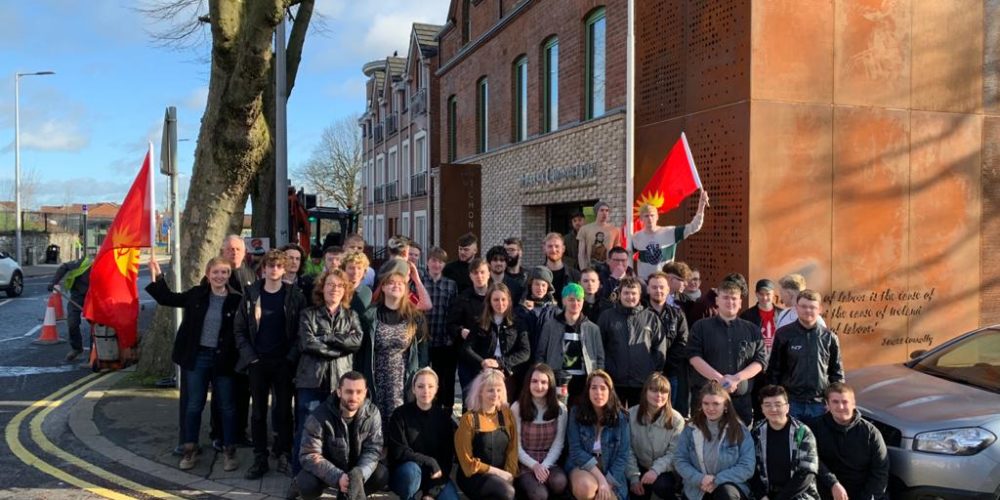“The Irish people have never been prepared to accept passively either domination from abroad or repression at home. Masters North and South are faced with a risen people. A new generation has grown up. An extrovert, aggressive generation, a questioning generation, thrusting at the bonds of the existing order.”
Manifesto of the first all-Ireland congress of the Connolly Youth Movement, 1970.
In 2015 delegates from two Irish cities made their way to East Essex Street in Dublin to conduct the Connolly Youth Movement’s annual congress. In 2018, delegates from three cities convened on Cork for the same purpose. In 2020, delegates, for the first time from branches established in six different cities, will congregate in Belfast for a weekend of camaraderie, discussion, and the formulation of policies and tactics of youth resistance to capitalism.
The political journey of the Connolly Youth Movement over the last decade has been astonishing, and all indications suggest that the best is still ahead, as rising levels of class-consciousness in Ireland are converging into a historically unprecedented threat to the political establishment.
There will be many different subjects for the congress participants to reflect on as we begin a new decade of struggle; but many of the problems and challenges facing the organisation are the kind of difficulties that are good to have: how to utilise the upsurge in membership and activity and translate it into effective action, how to build good cadreship, and how to place class struggle at the heart of a generation’s rejection of traditional politics.
As these questions are teased out through debates and workshops, a new link is being forged in an Irish communist movement fast approaching its centenary. The congress will feature a commemorative talk on the life of Madge Davison, the CYM’s first all-Ireland general secretary, and a guided tour of Belfast.
The movement’s goal has shifted from establishing its profile to becoming one of the main political institutions of the Irish working class. These goals are ambitious, but the central role of the CYM in society is to serve to school activists in practice, to prepare cadres for the responsibilities of serving and organising their communities. This feeling of responsibility differentiates the CYM from other youth organisations, which work on the basis of being an adjunct to electoral politics or debating societies; the CYM’s point, and the point of all communists, is to change the world. It emanates from a lived experience that is shared between young people all over the country, that the time for waiting for incremental improvements is over and that change needs to be substantial and immediate.
As socialist politics face the constant risk of being watered down or re-adjusted to fit the demands of the hegemonic totality of capitalism, more than ever a red youth is desperately needed to point out the shortcomings of the politics that social democracy, liberalism and conservatism are offering young people in this period, where everything is being reimagined: what it means to be Irish, what it means to be republican, what it means to be a socialist.
A rupture with the established orthodoxy of Fine Gael and Fianna Fáil has opened, and it is up to the cadres of the CYM to shape the future that will succeed it, to ensure that we have the theoretical tools for building a nation we can be proud of.
This constant reworking of these boundaries is occurring in concert with re-emerging prisms of social criticism of capitalism as young people are seeing the failure of capitalism in Ireland to facilitate language revival and environmental protection. The result is a country in suspended animation, and thousands of young people’s lives suspended along with it.
The red lines that were set by neo-liberal parties in the new consensus after 1991 have resulted in a disastrous crisis that touches upon every aspect of the lives of young people in Ireland. The laissez-faire approach of wealth as the primary policy-maker has produced a society where every social good is scrutinised, weighed and dissected for its profitability and worth, from mental health to accommodation, to language, to education, to democracy and trade union rights. Everything that is intrinsic to the potential of young workers and students is derided as useless, useless if it does not serve capital.
The will is now there to cross these red lines and to live in a country that is moving in a direction that gives voice to the voiceless and effect to all the deferred and misdirected hopes of the people of this country.
The next ten years will be crucial in shaping this direction, and as congress participants formulate a renewed programme this year the words from the documentary Rocky Road to Dublin (1968) will be foremost in their mind: “What do you do with your revolution once you’ve got it?” Coming together to share in building the coherence of that vision for a new Ireland is the energising and encouraging outcome of the CYM’s national discussions. Going forward, our determination will continue to be tinged with hope for the future as we enter what we demand will be the red decade.






